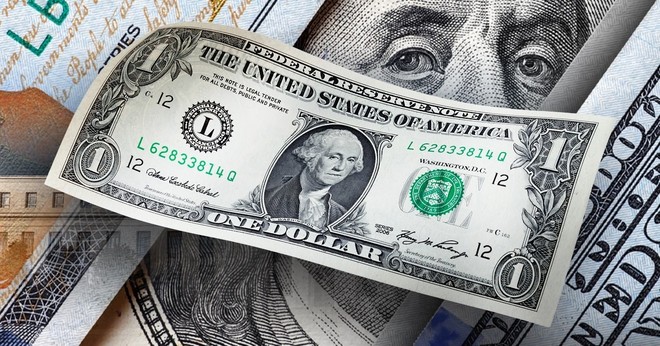TCDN – Central bank digital currencies, US sanctions could threaten the USD’s leading position in the financial market.
In a recent report, a research team from the Brookings Institution pointed out the changing position of the USD in the global financial market, as the use of this currency has been continuously decreasing over the past decades.
While the US dollar still dominates central bank reserves and world trade, it will account for only 59% of total global reserves by early 2024, down from 71% of reserves in 1999, according to estimates by the International Monetary Fund (IMF).
Meanwhile, the share of non-traditional currency reserves has increased slightly. Currencies such as the Australian dollar, Swiss franc and Chinese yuan accounted for 11% of global central bank reserves at the start of this year, up from 2% in 1999.
That decline has raised some concerns among investors that the dollar may soon lose its dominant position in financial markets. While most experts say that scenario is unlikely to happen anytime soon, the research group says the dollar’s dominance is facing major challenges, with four factors in particular.
Central Bank Digital Currency (CBDC)
Digital currencies issued by central banks could make it easier and cheaper to exchange non-traditional currencies. China is developing a CBDC, and China’s cross-border interbank payment system (CIPS) has also grown rapidly in the past few years.

The Fed has created a US instant payments network, but has yet to move to create a CBDC, with Fed Chairman Jerome Powell suggesting last year that a digital currency would require approval from lawmakers. That means the US risks falling behind other countries as digital payments technology rapidly develops.
Despite the warnings, however, most currency experts do not believe that de-dollarization poses a near-term threat to the United States or its currency. Currently, no competitor comes close to the dollar in financial markets, and countries that attempt to de-dollarize also risk suffering a host of economic consequences, including slower growth and lost investment value.
The evolution of payment technology
More advanced payment systems have made it easier to exchange non-traditional currencies, which could impact demand for the U.S. dollar, traditionally the most attractive medium of exchange.
“Converting such currencies into dollars and vice versa is usually easier and cheaper than exchanging them with each other. However, China and India will soon no longer need to exchange their respective currencies for dollars to conduct transactions at low cost. Instead, it will become cheaper to directly exchange yuan for rupees. As a result, the dependence on the medium currency, especially the dollar, will decrease,” said Eswar Prasad, a senior fellow at the Brookings Institution.
US sanctions
The US began implementing sanctions against Russia after the Russia-Ukraine conflict broke out in early 2022. Those sanctions fueled a de-dollarization campaign in Russia and other BRICS countries, which are looking to move away from the dollar in response to Western trade restrictions.
Russia, in particular, has taken steps to aggressively de-dollarize its economy, with the country adopting a yuan-to-ruble exchange rate, proposing a rival currency to the USD, and reportedly spearheading an alternative payments platform that is not dependent on the USD.
China has also signaled a shift away from the USD, promoting the yuan as an alternative.
“If the US arbitrarily launches sanctions, acts unilaterally and cannot build a doctrine on economic policy, the USD may be usurped,” commented researchers at the Brookings Institution.
US debt
The growing US debt burden could make currency holders more wary of the dollar, especially if observers fear the US could default.
While the US debt balance has not yet reached unsustainable levels, the rapid pace of government spending has not helped markets. Fitch Ratings downgraded the US credit rating last year, citing “continued deterioration in governance standards”.
“Congress has shut down the government multiple times over disagreements over appropriations. Further political turmoil could erode investor confidence in the dollar,” the researchers said.
TCDN – Central bank digital currencies, US sanctions could threaten the USD’s leading position in the financial market.
In a recent report, a research team from the Brookings Institution pointed out the changing position of the USD in the global financial market, as the use of this currency has been continuously decreasing over the past decades.
While the US dollar still dominates central bank reserves and world trade, it will account for only 59% of total global reserves by early 2024, down from 71% of reserves in 1999, according to estimates by the International Monetary Fund (IMF).
Meanwhile, the share of non-traditional currency reserves has increased slightly. Currencies such as the Australian dollar, Swiss franc and Chinese yuan accounted for 11% of global central bank reserves at the start of this year, up from 2% in 1999.
That decline has raised some concerns among investors that the dollar may soon lose its dominant position in financial markets. While most experts say that scenario is unlikely to happen anytime soon, the research group says the dollar’s dominance is facing major challenges, with four factors in particular.
Central Bank Digital Currency (CBDC)
Digital currencies issued by central banks could make it easier and cheaper to exchange non-traditional currencies. China is developing a CBDC, and China’s cross-border interbank payment system (CIPS) has also grown rapidly in the past few years.

The Fed has created a US instant payments network, but has yet to move to create a CBDC, with Fed Chairman Jerome Powell suggesting last year that a digital currency would require approval from lawmakers. That means the US risks falling behind other countries as digital payments technology rapidly develops.
Despite the warnings, however, most currency experts do not believe that de-dollarization poses a near-term threat to the United States or its currency. Currently, no competitor comes close to the dollar in financial markets, and countries that attempt to de-dollarize also risk suffering a host of economic consequences, including slower growth and lost investment value.
The evolution of payment technology
More advanced payment systems have made it easier to exchange non-traditional currencies, which could impact demand for the U.S. dollar, traditionally the most attractive medium of exchange.
“Converting such currencies into dollars and vice versa is usually easier and cheaper than exchanging them with each other. However, China and India will soon no longer need to exchange their respective currencies for dollars to conduct transactions at low cost. Instead, it will become cheaper to directly exchange yuan for rupees. As a result, the dependence on the medium currency, especially the dollar, will decrease,” said Eswar Prasad, a senior fellow at the Brookings Institution.
US sanctions
The US began implementing sanctions against Russia after the Russia-Ukraine conflict broke out in early 2022. Those sanctions fueled a de-dollarization campaign in Russia and other BRICS countries, which are looking to move away from the dollar in response to Western trade restrictions.
Russia, in particular, has taken steps to aggressively de-dollarize its economy, with the country adopting a yuan-to-ruble exchange rate, proposing a rival currency to the USD, and reportedly spearheading an alternative payments platform that is not dependent on the USD.
China has also signaled a shift away from the USD, promoting the yuan as an alternative.
“If the US arbitrarily launches sanctions, acts unilaterally and cannot build a doctrine on economic policy, the USD may be usurped,” commented researchers at the Brookings Institution.
US debt
The growing US debt burden could make currency holders more wary of the dollar, especially if observers fear the US could default.
While the US debt balance has not yet reached unsustainable levels, the rapid pace of government spending has not helped markets. Fitch Ratings downgraded the US credit rating last year, citing “continued deterioration in governance standards”.
“Congress has shut down the government multiple times over disagreements over appropriations. Further political turmoil could erode investor confidence in the dollar,” the researchers said.



